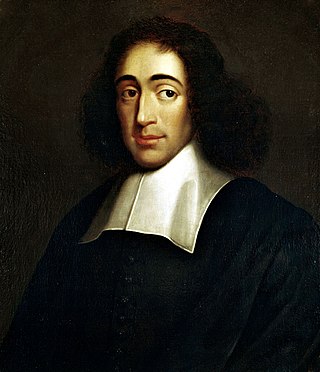Related Research Articles

René Descartes was a French philosopher, scientist, and mathematician, widely considered a seminal figure in the emergence of modern philosophy and science. Mathematics was central to his method of inquiry, and he connected the previously separate fields of geometry and algebra into analytic geometry. Descartes spent much of his working life in the Dutch Republic, initially serving the Dutch States Army, later becoming a central intellectual of the Dutch Golden Age. Although he served a Protestant state and was later counted as a Deist by critics, Descartes was Roman Catholic.

Thomas Hobbes was an English philosopher. Hobbes is best known for his 1651 book Leviathan, in which he expounds an influential formulation of social contract theory. In addition to political philosophy, Hobbes contributed to a diverse array of other fields, including history, jurisprudence, geometry, theology, and ethics, as well as philosophy in general. He is considered to be one of the founders of modern political philosophy.
David Gauthier is a Canadian-American philosopher best known for his neo-Hobbesian social contract (contractarian) theory of morality, as developed in his 1986 book Morals by Agreement.

Analytic philosophy is a branch and tradition of philosophy using analysis, popular in the Western world and particularly the Anglosphere, which began around the turn of the 20th century in the contemporary era in the United Kingdom, United States, Canada, Australia, New Zealand, and Scandinavia, and continues today. Analytic philosophy is often contrasted with continental philosophy, coined as a catch-all term for other methods, prominent in Europe.

Sir Bernard Arthur Owen Williams, FBA was an English moral philosopher. His publications include Problems of the Self (1973), Ethics and the Limits of Philosophy (1985), Shame and Necessity (1993), and Truth and Truthfulness (2002). He was knighted in 1999.

Early modern philosophy is a period in the history of philosophy that overlaps with the beginning of the period known as modern philosophy.

Modern philosophy is philosophy developed in the modern era and associated with modernity. It is not a specific doctrine or school, although there are certain assumptions common to much of it, which helps to distinguish it from earlier philosophy.
Jonathan Francis Bennett is a philosopher of language and metaphysics, specialist of Kant's philosophy and a historian of early modern philosophy. He has New Zealand citizenship by birth and has since acquired UK and Canadian citizenship.
David Schmidtz is a Canadian-American philosopher. He is Presidential Chair of Moral Science at West Virginia University's Chambers College of Business and Economics. He is also editor-in-chief of the journal Social Philosophy & Policy. Previously, he was Kendrick Professor of Philosophy and Eller Chair of Service-Dominant Logic at the University of Arizona. While at Arizona, he founded and served as inaugural head of the Department of Political Economy and Moral Science.

In the philosophy of Baruch Spinoza, conatus is an innate inclination of a thing to continue to exist and enhance itself. This thing may be mind, matter, or a combination of both, and is often associated with God's will in a pantheist view of nature. The conatus may refer to the instinctive will to live of living organisms or to various metaphysical theories of motion and inertia. Today, conatus is rarely used in the technical sense, since classical mechanics uses concepts such as inertia and conservation of momentum that have superseded it. It has, however, been a notable influence on later thinkers such as Arthur Schopenhauer and Friedrich Nietzsche.

Western philosophy refers to the philosophical thought and work of the Western world. Historically, the term refers to the philosophical thinking of Western culture, beginning with the ancient Greek philosophy of the pre-Socratics. The word philosophy itself originated from the Ancient Greek philosophía (φιλοσοφία), literally, "the love of wisdom" Ancient Greek: φιλεῖν phileîn, "to love" and σοφία sophía, "wisdom").
David Edward Cooper is Emeritus Professor of Philosophy at Durham University.
Richard Burthogge (1637/38–1705) of Devon, England, was a physician, magistrate and philosopher.
Glen Francis Newey was a political philosopher, last acting as a Professor of Practical Philosophy at the University of Leiden. He previously taught in Brussels at the Université Libre de Bruxelles and until 2011 was Professor in the School of Politics, International Relations & Philosophy at Keele University, Staffordshire, England. He was a prominent member of the "Realist" school of political philosophers which also includes such figures as Bernard Williams, John N. Gray, and Raymond Geuss. Newey also wrote extensively about toleration, casting doubt on whether it remains a coherent political ideal in modern liberal-democratic societies.

British philosophy refers to the philosophical tradition of the British people. "The native characteristics of British philosophy are these: common sense, dislike of complication, a strong preference for the concrete over the abstract and a certain awkward honesty of method in which an occasional pearl of poetry is embedded".
Professor David Simon Oderberg is an Australian philosopher of metaphysics and ethics based in Britain since 1987. He is Professor of Philosophy at the University of Reading. He describes himself as a non-consequentialist or a traditionalist in his works. Broadly speaking, Oderberg places himself in opposition to Peter Singer and other utilitarian or consequentialist thinkers. He has published over thirty academic papers and has authored six books: The Metaphysics of Good and Evil, Opting Out: Conscience and Cooperation in a Pluralistic Society, Real Essentialism, Applied Ethics, Moral Theory, and The Metaphysics of Identity over Time. Professor Oderberg is an alumnus of the Universities of Melbourne, where he completed his first degrees, and Oxford where he gained his D.Phil.
John Cottingham is an English philosopher. The focus of his research has been early-modern philosophy, the philosophy of religion and moral philosophy. He is a Professor Emeritus of Philosophy at the University of Reading, Professorial Research Fellow at Heythrop College, University of London, and Honorary Fellow of St John's College, Oxford. He is also a current Visiting Professor to the Philosophy Department at King's College, London.
This is a timeline of philosophy in the 17th century.
Susan James is a British professor of philosophy at Birkbeck College London. She has previously taught at the University of Connecticut and the University of Cambridge. She is well known for her work on the history of seventeenth and eighteenth century philosophy.
Luc Foisneau, born in Blois on 30 March 1963, is a French philosopher specialising in contemporary political thought and that of the Early Modern period. Director of research at CNRS, he is a member of the Centre Raymond Aron, and teaches at School for Advanced Studies in the Social Sciences.
References
- 1 2 3 Richard Marshall, 'Innocent Descartes and Sober Hobbes' (interview with Tom Sorell), 3:16: Richard Marshall's Philosophy Interviews after 3:AM ([August 2019]).
- ↑ 'Professor Tom Sorell'.
- ↑ E.g. Hobbes (Routledge, 1986).
- ↑ E.g. Descartes (Oxford University Press, 1987); ‘Bodies and the Subjects of Metaphysics and Ethics in Descartes’, Revistia di Storia della Filosofia 3 (2000) pp. 369-379; and ‘Descartes, the Divine Will and the Ideal of Psychological Stability’, History of Philosophy Quarterly 17 (2000) pp. 361-379.
- ↑ Tom Sorell and John Rogers, ed. Analytic Philosophy and History of Philosophy (Oxford University Press, 2005).
- ↑ The Rise of Modern Philosophy (Oxford University Press, 1993).
- ↑ Tom Sorell, John Rogers and Jill Kraye, Insiders and Outsiders in Early Modern Philosophy (Routledge, 2009).
- ↑ (Routledge, 1991).
- ↑ Moral Theory and Anomaly (Blackwell, 1999).
- ↑ Moral Theory and Capital Punishment (Backwell, 1988).
- ↑ Tom Sorell and Heather Draper, 'Robot carers, ethics, and older people', Ethics and Information Technology (2014).
- ↑ Tom Sorell et al. 'Responsible AI – Key Themes, Concerns & Recommendations for European Research and Innovation -- Summary of Consultation with Multidisciplinary Experts' (2018).
- ↑ 'Preventive Policing, Surveillance and European Counter-Terrorism', Criminal Justice Ethics 30 (2011), pp. 1-22.
- ↑ Contribution on surveillance to the Philosophy Bites podcast.
- ↑ 'Organized Crime and Peventive Justice', Ethical Theory and Moral Practice (2018).
- ↑ 'Morality and Emergency', Proceedings of Aristotelian Society 103 (2002), pp. 21-37.
- ↑ Tom Sorell et al., Will the NHS continue to function in an influenza pandemic? A survey of healthcare workers in the West Midlands, UK BMC Public Health (2009), 9:142.
- ↑ Tom Sorell and James Dempsey, eds. Midwest Studies in Philosophy (2018).
- ↑ E.g. 'Online Grooming and Preventive Justice’, Criminal Law and Philosophy (2016) and ‘Scambaiting on the Spectrum of Digilantism’, Criminal Justice Ethics (2019).